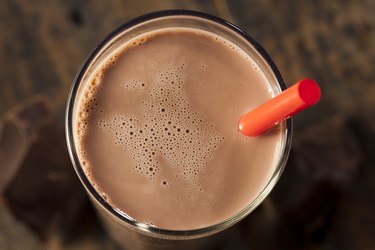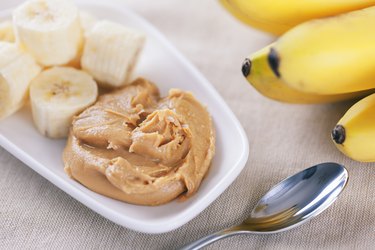
What do you reach for after a long run or a tough strength-training workout? For several years now, chocolate milk has been positioned as the optimal, post-exercise recovery drink. While it is inexpensive and readily available, some experts challenge the notion that chocolaty dairy is the ultimate nutritional choice after a serious sweat session.
Video of the Day
Video of the Day
How Chocolate Milk Became a Go-To Post-Workout Drink
The goal of a post-workout snack or drink is to replenish fluid and nutrients that have been lost during training and provide the raw materials needed to heal from the wear and tear exercise puts on the body. Both carbohydrates and protein are key macronutrients needed for recovery — and experts recommend getting them in a 4:1 ratio.
One cup of low-fat chocolate milk contains 7.5 grams of protein and 30 grams of carbohydrates, according to the USDA. That's right in the recommended macro ballpark, and this ratio is one of the reasons why chocolate milk has been touted as a post-exercise go-to.
One frequently cited study supporting chocolate milk was published in February 2006 in the International Journal of Sports Nutrition and Exercise Metabolism. On three separate days, nine male endurance-trained cyclists performed an interval workout, took a four-hour rest and then resumed cycling to exhaustion. After the first bout of exercise and two hours into recovery, the athletes either drank chocolate milk, a lower-carbohydrate replacement drink with electrolytes or a higher-carbohydrate replacement drink with the same amount of carbs as the chocolate milk.
Researchers found that the athletes who drank chocolate milk and the fluid replacement drink were able to cycle more and took longer to reach exhaustion compared to those who drank the carbohydrate replacement beverage.
Chocolate milk provides some key nutrients that support exercise recovery, and the ratio of carbs to protein is pretty spot on. What the research has not shown is that chocolate milk — specifically or definitively — is the best recovery option compared to drinks or food with a similar nutrient profile.
The research, supported in part by the Dairy and Nutrition Council, Inc. is interesting — but it isn't comparing apples to apples. The conclusions are less about chocolate milk and more about the nutrient composition of various recovery drinks. It's also a very small study in a specific group of athletes and is focused on exercising to exhaustion and multiple daily workouts — which may or may not apply to active recovery seekers.
A further look at the research provides more insight into why chocolate milk has held the recovery crown. In a September 2017 review published in the European Journal of Clinical Nutrition, researchers looked at 12 previous studies that compared chocolate milk to either water or sports drinks, to assess post-exercise recovery markers.
The scientists point out that chocolate milk seems to be a good candidate to aid in recovery since it contains carbohydrates, protein, water and electrolytes (like sodium and potassium), which are all necessary nutrients for replenishment and healing. True — but again, the studies compare chocolate milk to other dissimilar drinks.
More recently, researchers looked at the effects of dairy intake on exercise performance and muscle recovery in people. In their evaluation of 11 previously published studies, the authors conclude that, well, more research is needed, according to the May 2019 study published in the Journal of the International Society of Sports Nutrition.
But here's what we do know: Chocolate milk provides some key nutrients that support exercise recovery, and the ratio of carbs to protein is pretty spot on. Cow's milk also contains leucine, an amino acid needed to trigger muscle protein synthesis, as noted in a March 2016 report in the Journal of the Academy of Nutrition and Dietetics.
What the research has not shown is that chocolate milk — specifically or definitively — is the best recovery option compared to drinks or food with a similar nutrient profile. Therefore, there are some important reasons to consider other alternatives.
Why Chocolate Milk May Not Be the Best Option
One cup of chocolate milk packs 24 grams of sugar and 11.5 of those grams come from added sugar — the type added to foods to sweeten them. Note that women should get no more than 25 grams of added sugar daily, and men 36 grams, according to the American Heart Association (AHA).
Most American adults already get more added sugar than is recommended for a healthy diet, per an April 2014 study published in JAMA Internal Medicine. And researchers observed a significant relationship between added sugars and increased risk for heart disease mortality — confirming the importance of the AHA's guidelines.
Read more: Does Chocolate Milk Ruin a Healthy Diet?
If you're wondering about bone health, newer studies have found that dairy might not offer the protection you might expect. In fact, taking in dairy-derived calcium wasn't associated with a lowered risk of getting bone fractures, according to a July 2018 meta-analysis published in the British Medical Journal.
And another study reported similar findings in addition to an association between higher intake of milk and a higher rate of death, according to an October 2014 study in the British Medical Journal.
Warning
Around 65 percent of the human population is lactose intolerant, aka they have a reduced ability to digest lactose, the naturally occurring sugar in cow's milk, according to the National Institutes of Health. Milk is also one of the eight foods that account for 90 percent of all food allergies, according to the U.S. Food and Drug Administration (FDA). For people with lactose intolerance or a milk allergy, chocolate milk should be avoided.
What to Drink or Eat After a Workout Instead

After a tough workout, you need key nutrients for recovery — but there are many options other than chocolate milk.
Try a different plant-based option: Instead, go for a fruit smoothie made with soy milk, or even a non-beverage option, like a banana and peanut butter paired with a glass of water, Matt Ruscigno, RD, co-author of Plant-Based Sports Nutrition, recommends. Oatmeal made with water and topped with salted pumpkin seeds is another good choice.
All three meet the 4:1 carb to protein ratio and replenish fluid and electrolytes; and soy, peanut butter, oats and pumpkin seeds are among the top plant-based sources of muscle-building leucine. These meals also supply additional vitamins, minerals, antioxidants and fiber.
If you still need that chocolate fix: Break off an ounce of 70-percent dark cocoa squares. In addition to providing antioxidants, this treat contains magnesium. This important mineral helps maintain normal nerve and muscle function, heart rhythm and blood pressure, and it also supports immunity, bone health and promotes calcium absorption, according to a 2015 paper published in Current Sports Medicine Reports.
These are all important benefits for athletes and active people — no milk required.
The Big Picture
Finally, it's important to keep in mind that for most active people, what you eat or drink immediately after a workout may be less important for recovery than your overall dietary pattern.
The window of opportunity for recovery is much longer than previously thought, according to a January 2013 article published in the Journal of the International Society of Sports Nutrition. In other words, your body has ample time to recover after a workout and may do so via nutrients consumed in normal meals throughout the day.
Just be sure to meet your total protein and calorie needs, and eat a balanced, nutrient-rich diet.
- International Journal of Sport Nutrition and Exercise Metabolism: "Chocolate Milk as a Post-Exercise Recovery Aid"
- European Journal of Clinical Nutrition: "Chocolate Milk for Recovery from Exercise: A Systematic Review and Meta-Analysis of Controlled Clinical Trials"
- Journal of the International Society of Sports Nutrition: "Impact of Cow’s Milk Intake on Exercise Performance and Recovery of Muscle Function: A Systematic Review"
- Journal of the Academy of Nutrition and Dietetics: "Position of the Academy of Nutrition and Dietetics, Dietitians of Canada, and the American College of Sports Medicine: Nutrition and Athletic Performance"
- National Institutes of Health: "Lactose Intolerance"
- British Medical Journal: "Assessment of the Genetic and Clinical Determinants of Fracture Risk: Genome Wide Association and Mendelian Randomisation Study"
- British Medical Journal: "Milk Intake and Risk of Mortality and Fractures in Women and Men: Cohort Studies"
- American Heart Association: "Added Sugars"
- Journal of the International Society of Sports Nutrition: "Nutrient Timing Revisited: Is There a Post-Exercise Anabolic Window?"
- Current Sports Medicine Reports: "Magnesium and the Athlete"
- JAMA Internal Medicine: “Added Sugar Intake and Cardiovascular Diseases Mortality Among US Adults”
- USDA: "Lowfat Chocolate Milk"